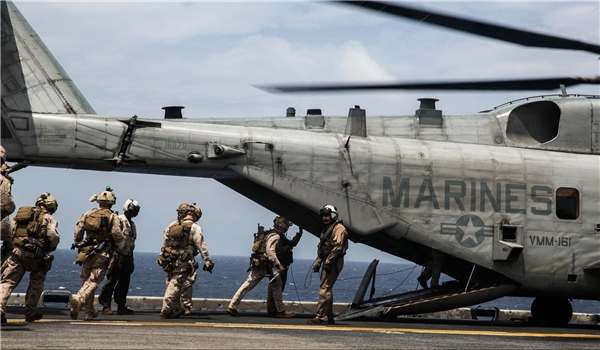
RNA - The news from White House press secretary Sarah Huckabee Sanders follows comments President Trump made in recent days about US forces in the country, including, "I want to get out. I want to bring our troops back home." He also said troops would be out "like very soon," — an assessment at odds with that of Army Gen. Joseph Votel, the US Central Command chief, who has said, "The hard part is in front of us."
The never-ending US-led war on Syria and the extended presence of US troops is in no way surprising:
- Thousands of US occupying troops will remain in Syria (with no legal basis whatsoever) just as the way they have occupied so many other places in the Middle East, including Afghanistan, Iraq, and Yemen. The idea is not war on terror, as press secretary Sanders would like to suggest. Washington and company have regional designs and they are even prepared for more endless wars if they feel that they have the needed potentials and if they see any chance of success.
- American troops will remain in Syria because Saudi Arabia says so: President Trump has said in a message to Saudi Arabia: “If you want us to stay, maybe you’re going to have to pay.” Obviously, the Syria war feeds the never-ending appetite of the Military-Industrial Complex and is good for regional arms race and American jobs. Besides, the Americans can also continue work with their terror proxies because they are still needed for regime change that we all know has failed.
- Although the impulse to try to affect regime change in Damascus all over again is understandable, it would be a very bad idea. Empirical studies have repeatedly demonstrated that US military involvement in Syria only exacerbates violence. Actually, it has increased the duration of the conflict, making it longer and bloodier, and the regional consequences more serious. Even putting aside the recent White House announcement, however, virtually anyone familiar with American politics and military can recognize the fallacy of such US support for the so-called “moderate” militants in Syria.
- The question is not whether thousands will continue to die as a result of further military presence of the United States but what is the best way for the Syrian people to end the violence. That best way has already been presented by Iran, Russia and Turkey in the form of de-escalation zones and ongoing peace talks between the Syrian government and the opposition – not terrorists. However, there is little question that the regime changers led by Washington want none of this.
- The history of US relations with Al-Qaeda-affiliates that it calls “moderates” makes Washington a particularly inappropriate advocate for peace talks and military intervention. On the one hand, these militants are allied with ISIL and Al-Qaeda supporting US foreign policy goal of regime change. On the other, longer US military occupation would simply play into the hands of Saudi Arabia and Israel, which have for years manipulated the Syrian opposition to their benefit. These regimes are the primary military supplier to the remaining terrorist groups in Syria, including the Al-Nusra and the ISIL, which make no secret of their ties to Tel Aviv and Riyadh. Israel has even released videos of its aid to the Al-Nusra and other Al-Qaeda-affiliated groups.
- Last but not the least, the United States doesn’t care about democracy in Syria any more than it does about democracy and human rights in Saudi Arabia, Bahrain and Israel but is using the “promotion of democracy” as an excuse to occupy Syria permanently, and overthrow a government that happens to oppose Washington’s hegemonic designs on the region.
According to Fars News Agency, recent history has shown that a prolonged US military occupation of Syria is far less likely to be successful than previous attempts to impose regime change in Damascus. It also makes peace between the Syrian government and the opposition less likely, an objective shared by Israel and Saudi Arabia, but the major difference is that Riyadh is even willing to pay for it. It also increases the number of active participants in the war to make it possible for the US to better trouble the country's move towards peace and stability.
In the prevailing environment, the best hope for Syria is for the government and the opposition to continue peace talks; and for the allied forces of Iran, Syria, Russia and Hezbollah to continue their lawful battle against all foreign-backed terrorist groups and extremists. Indeed, this is the scenario that eventually will end the tragic violence and force an end to America’s military occupation.
847/940